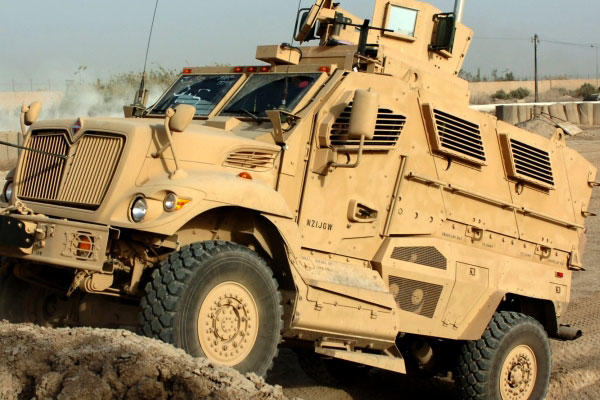U.S. warplanes on combat patrols over northern Iraq increasingly are hitting U.S.-made armored vehicles captured by Islamic militants from the fleeing Iraqi army.
In the latest airstrikes Thursday, the U.S. Central Command said that a mix of fighters and armed drones destroyed one of the heavily-armored Mine Resistant-Ambush Protected (MRAP) vehicles that were a mainstay of U.S. forces in Iraq and Afghanistan.
The MRAP was targeted after the warplanes destroyed two other armored vehicles northeast of the Kurdish capital of Irbil that were being used by fighters of the Islamic State of Iraq and the Levant to fire on positions held by the Kurdish peshmerga forces, the Central Command said in a statement.
In previous airstrikes, U.S. warplanes have targeted several vehicles believed to be up-armored U.S. Humvees that had been supplied to the Iraqi army.
One of the major concerns of the U.S. in considering urgent requests from the Kurdish Regional Government and the Iraq government for arms shipments has been the prospect that U.S. weaponry might fall into enemy hands.
The White House and the Pentagon have pressed for the Iraqis to form a unity government as a preconditon to more military and humanitarian assistance. The Iraqis have pressed for the U.S. to follow through on previous agreements to ship arms, including F-16 fighters.
The Iraqis appeared to have cleared a major hurdle to getting new arms shipments Thursday, when Iraqi Prime Minister Nouri al-Maliki agreed to step down in favor of Haider al-Abadi, a British-educated former Communications Minister.
The Kurds have repeatedly said that they are overstretched and outgunned in combating ISIL forces equipped with armored vehicles, long-range artillery and tanks captured by the militants.
In a plea for aid to the European Union, Fuad Hussein, chief of staff to KRG President Massoud Barzani, said in a statement Friday that "Kurdish forces are in an asymmetrical war against an organized and well-armed terrorist group."
"With no doubt, rapid equipping of peshmerga forces with heavy and sophisticated weapons will change the equation in the battlefield in favor of the Kurdish peshmerga forces," Hussein said.
In Brussels Friday, foreign and defense ministers of the European Union gave a positive response to the Kurdish requests.
The 28 nations of the EU bloc agreed on a plan to allow direct arms shipments to the Kurds while boosting humanitarian aid for members of the Yazidi sect and other refugees who have fled the ISIL advance.
"First of all we need to make sure that we alleviate humanitarian suffering," Dutch Foreign Minister Frans Timmermans said, the Associated Press reported.
"Secondly, I believe we need to make sure that (ISIL) is not in a position to overrun the Kurds or to take a stronger hold on Iraq," Timmermans said.
French President Francois Hollande has already pledged to ship weapons to the Kurds, and Britian has pledged to deliver ammunition.
"Weapons are already being delivered by other countries," German Defense Minister Ursula von der Leyen told the Bild newspaper Friday. "We are at present examining what kind of further military equipment we can send," she said.
-- Richard Sisk can be reached at richard.sisk@monster.com




























